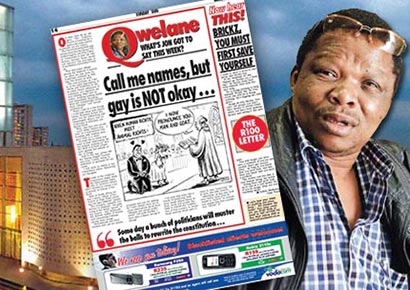Jon Qwelane homophobic hate speech trial returns to court – 8 years on!
 An astonishing eight years after writing his infamous homophobic article, disgraced journalist Jon Qwelane will once again face hate speech charges in court.
An astonishing eight years after writing his infamous homophobic article, disgraced journalist Jon Qwelane will once again face hate speech charges in court.
Qwelane was convicted for hate speech in 2011, but has challenged the ruling on the basis that sections of the Equality Act, under which he was convicted, infringe on his constitutional right to free speech.
The court case is now set to resume in the South Gauteng High Court, running from 29 August to 9 September. The South African Human Rights Commission (SAHRC), which originally brought the case against Qwelane, is again seeking an apology and damages from him.
The Psychological Society of South Africa (PsySSA) has been admitted as a ‘friend of the court’ in the matter and will testify against Qwelane.
PsySSA will present evidence and make submissions regarding the purpose served by section 10(1) of the Equality Act “to stem systemic verbal and physical violence”.
PsySSA will also present research-based evidence of the harmful psychological effects and consequences of hate speech on members of the LGBTI community and on broader society.
In a statement, it argued that, “the Equality Act does not criminalise hate speech. Rather it balances the right to freedom of expression against the constitutional protection of equality and dignity of all persons, regardless of their status or identity”.
The organisation believes that while the legislation does limit free speech, it does so in a manner “that is reasonable and justifiable” and satisfies the requirements of section 36 of the Constitution, which deals with when the “limitation of rights” is appropriate.
“It is critical that in making its determination, the court considers the nature and extent of the material harm caused by homophobic hate speech,” commented Professor Juan Nel, Department of Psychology, University of South Africa, and past president of PsySSA.
“This wider social context is critical to understanding the tangible consequences of such hate speech on the lives of those who are its target and society at large”, he said.
Prof Saths Cooper, President of the International Union of Psychological Science, added that, “through its submissions to the court, PsySSA will show how an understanding of the psychological effects of the underlying prejudices in our society and their expression is necessary for the development of a healthy post-apartheid South Africa”.
Section 10(1) of the Equality Act reads: “Subject to the proviso in section 12, no person may publish, propagate, advocate or communicate words based on one or more of the prohibited grounds, against any person, that could reasonably be construed to demonstrate a clear intention to – (a) be hurtful; (b) be harmful or to incite harm; (c) promote or propagate hatred.”
In his 2008 article, Call me names, but gay is NOT okay…, published in the Sunday Sun, Qwelane compared homosexuality to bestiality and urged politicians to remove the sexual orientation equality clause from the Constitution.
In 2011, an Equality Court ruled that the article “propagates hatred and harm against homosexuals” and ordered Qwelane to apologise to the gay community and to pay damages of R100,000 towards an LGBTI rights group. Qwelane had the ruling rescinded on a technicality, but the SAHRC re-filed the charges.
Despite his statements flouting the country’s Constitution, Qwelane was unexpectedly made South Africa’s high commissioner in Uganda by President Jacob Zuma in 2010. This was described at the time as a “F*** you” to South Africa’s and Uganda’s LGBT communities. Qwelane left the position some time in 2014.
Leave a Reply